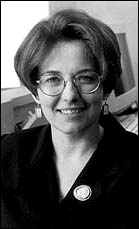![]()
Departments
![]()

|
Week of 26 September 1997 |
Vol. I, No. 5 |
Feature
Article
|
The Undergraduate Research Opportunities Program New program promotes faculty and undergraduate researchby Brian Fitzgerald Boston University has recently established a program to foster research relationships between undergraduates and faculty. The Undergraduate Research Opportunities Program (UROP) "is designed to connect faculty research interests with undergraduates who want to participate in research projects for academic credit, for stipend, or on a volunteer basis," says Sharon Prado, UROP's director. Collaboration between graduate students and professors on research projects is common in higher education, but such work increasingly involves undergraduates as well. And some faculty-student research projects are taking Boston University undergraduate studies not only beyond the classroom, but out of this world: the Center for Space Physics' Terriers satellite, for example, is expected to be launched into orbit next spring. Indeed, BU has numerous opportunities for undergraduates to participate in research projects with professors. But until recently the entire process -- from the proposal stage to the actual thesis -- usually took place within a specific school and department.
"UROP is a University-wide effort," says Prado. "It will serve as a clearinghouse for research opportunities, promote faculty interests and projects and help students identify projects and ultimately disseminate their research findings." UROP's office is at 143 Bay State Road, but Prado notes that much of the program will be based on the World Wide Web (www.bu.edu/UROP). "It will be on-line, interactive, and as paperless as possible," she says. Currently on the Web site are listings for research opportunities posted by faculty members. Students may submit proposals for spring and summer projects. Funding will be available in the spring. Because more than 250 institutions have similar programs, Prado says the formation of UROP "enables Boston Uni-versity to better compete for funding from foundations, corporations, and individuals particularly interested in the quality of undergraduate education." She also points out that the program will give undergraduates a better chance to win national prizes awarded by professional organizations, thus strengthening their job-placement profiles. Opportunities to conduct research with faculty "are what students and parents are looking for at universities," says Michael Ruane, associate dean ad interim of the College of Engineering. "The experiences provide very distinguishing credentials when they apply for professional internships and summer jobs. And when they approach graduation, engineering and science students can add to their résumés the fact that they have worked in a laboratory re-search environment. That kind of experience is very important to employers." High school seniors "are also looking for colleges and universities that provide individualized education," Ruane says. Prado echoes the point that there is often a perception that large universities are too impersonal to provide meaningful faculty-student interaction. She says that UROP is designed to minimize the distance between faculty and students. Ruane notes that undergraduate research opportunities at BU are already extensive. "There are so many examples," he says. "One of my students, Vincent Leslie (ENG'98) worked on a research project through the Photonics Center and the Electrical Engineering Department last spring as an hourly employee, helping a company design and construct an electronics system that would support a navigational gyroscope." The company, SES Systems Engineering Solutions, a spinoff of Draper Laboratories in Cambridge, then gave Leslie a summer job. He also says that ENG's summer Freshman Research Opportunities Program puts students in laboratories even before they attend BU in the fall. "There have always been plenty of faculty-research opportunities throughout the University," he says. "But now there is one central program to coordinate them." CAS Associate Dean Scott Whitaker says that UROP will also facilitate interdisciplinary research: "Students in the economics department will be able to learn about opportunities in the School of Education or the School of Management. History majors could look into what is happening in the Department of International Relations." Ruane, Whitaker, and Biology Professor Christine Li worked with the Office of the Provost in developing UROP. The creation of the program was originally recommended by the 1995-96 University Council on Research and Libraries under the leadership of its chairman, Prof. Eugene Stanley. Prado says that UROP's definition of research is broad. "Students may participate in any scientific, scholarly, or artistic activity that leads to the production of new knowledge, increased problem-solving capabilities including design and analysis, original critical or historical theory and interpretation." Typically, the UROP research process will begin with students identifying research projects and approaching a faculty member with proposals. "I will be available for consultation with students during this proposal approval stage," Prado says. After faculty supervisors and sponsors sign the proposal, departmental UROP coordinators will approve the projects. Then Prado will assign final approval. A 10-member faculty advisory committee will assist the director in the evaluation of proposals for UROP funding. Prado, an experienced administrator and teacher, earned a PhD in musicology at the University of Cincinnati. She served most recently in Harvard University's History of Science Program. "Our mission is to further integrate research into the undergraduate experience," she says. "This program is a major step in that direction." She adds that UROP will hold an open house during Homecoming and Parents Weekend, on Friday, Oct. 24, from 2 p.m. to 6 p.m. "We're hoping to accept proposals for UROP funding by mid-November, so that funds can be distributed for spring and summer projects," she says. |
